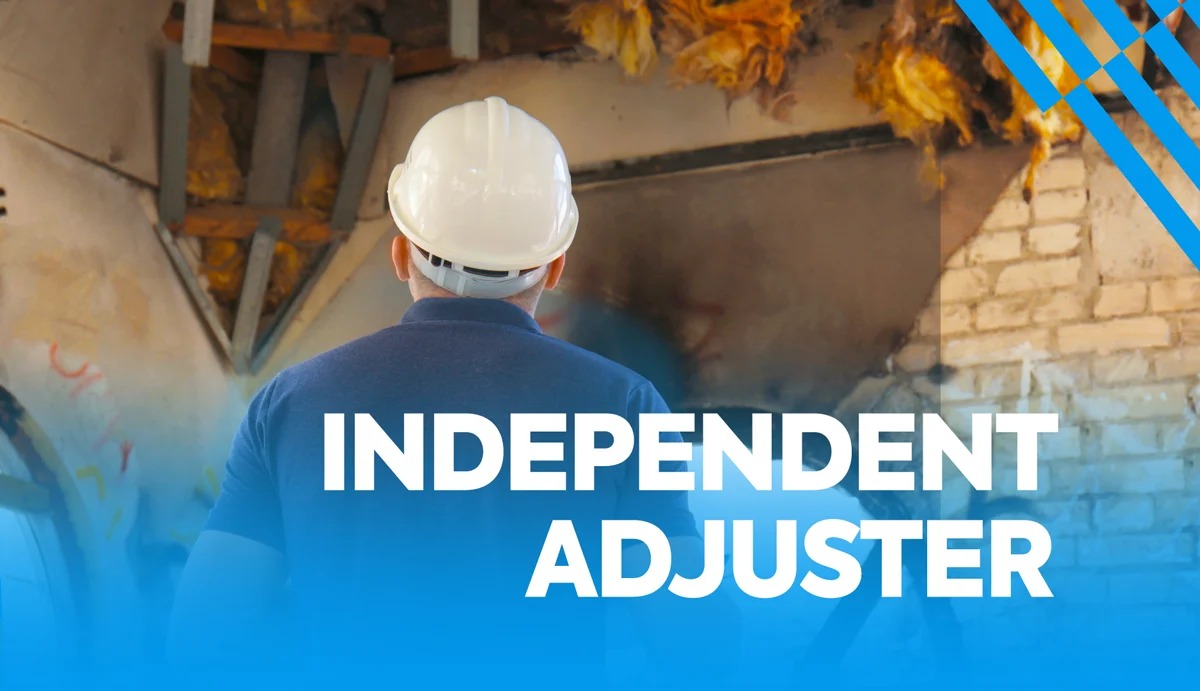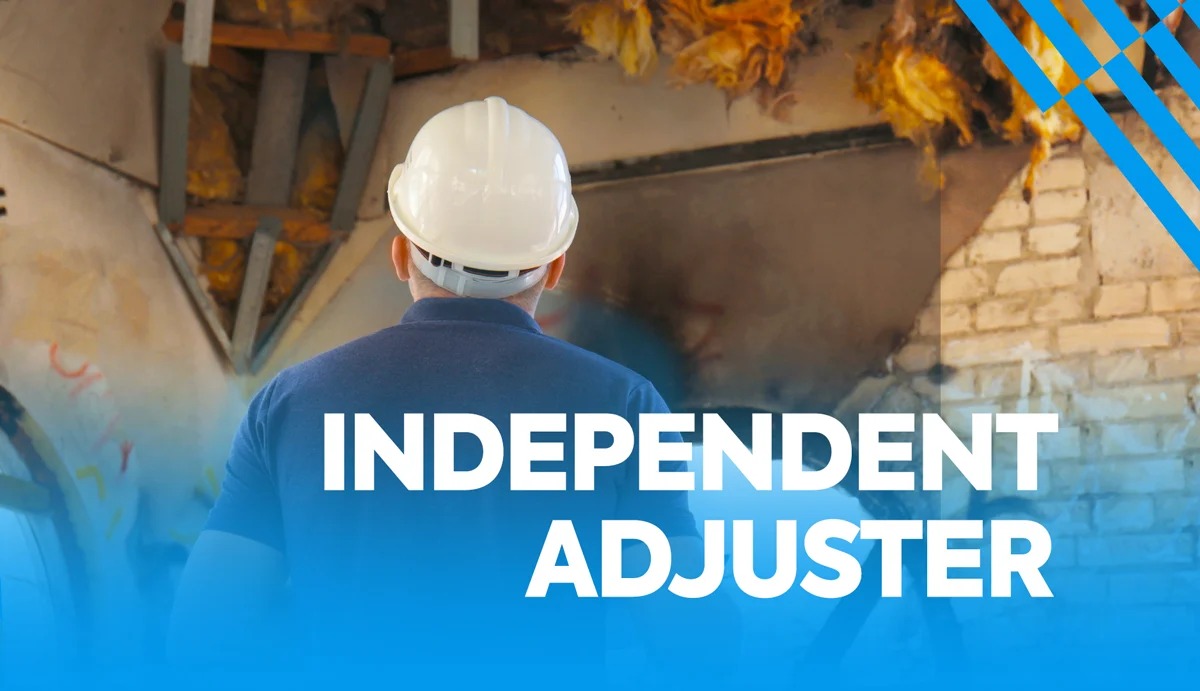

Finance
How To Become An Insurance Adjuster In Texas
Modified: December 30, 2023
Learn how to become an insurance adjuster in Texas and start a rewarding career in the finance industry. Explore the requirements, licensing process, and job opportunities.
(Many of the links in this article redirect to a specific reviewed product. Your purchase of these products through affiliate links helps to generate commission for LiveWell, at no extra cost. Learn more)
Table of Contents
- Introduction
- Step 1: Understand the Role of an Insurance Adjuster in Texas
- Step 2: Meet the Basic Requirements
- Step 3: Complete the Required Education or Training
- Step 4: Obtain an Insurance Adjuster License in Texas
- Step 5: Gain Experience in the Field
- Step 6: Stay Updated with Continuing Education
- Step 7: Network and Build Relationships with Insurance Companies
- Step 8: Consider Specializing in a Specific Area
- Step 9: Maintain Professionalism and Ethical Standards
- Conclusion
Introduction
Are you interested in a career in the insurance industry? Becoming an insurance adjuster in Texas can offer a challenging and rewarding path. Insurance adjusters play a crucial role in assessing and evaluating insurance claims, ensuring fair settlements for policyholders. Whether it’s determining the extent of property damage after a natural disaster or investigating liability in an auto accident, insurance adjusters are entrusted with making informed decisions that impact individuals and businesses.
Working as an insurance adjuster in Texas requires a combination of knowledge, skills, and qualifications. This article will guide you through the steps to become an insurance adjuster in Texas and set you on the path to a successful career in the industry.
In this comprehensive guide, we will break down the requirements, education, licensing, and experience necessary to become an insurance adjuster in Texas. Additionally, we will provide tips on building relationships with insurance companies, staying updated with industry changes, and advancing your career as a specialized adjuster.
While the process may seem daunting at first, rest assured that with dedication and the right resources, you can become a sought-after insurance adjuster in Texas.
So, let’s dive in and explore how you can begin your journey to become an insurance adjuster in the great state of Texas!
Step 1: Understand the Role of an Insurance Adjuster in Texas
Before diving into the process of becoming an insurance adjuster in Texas, it’s important to have a clear understanding of the role and responsibilities of this profession. An insurance adjuster is essentially a claims investigator whose primary job is to assess insurance claims and determine the appropriate settlement for policyholders.
In Texas, insurance adjusters play a vital role in various types of claims, including property damage, auto accidents, bodily injury, and even liability investigations. Insurance adjusters are responsible for conducting thorough investigations, interviewing parties involved, collecting evidence, and analyzing the policy coverage to determine the extent of the claim.
As an insurance adjuster in Texas, you will need to have excellent analytical and problem-solving skills. You will review documents, such as police reports, medical records, and property damage assessments, to evaluate the validity and extent of the claim. Additionally, good negotiation and communication skills are essential, as you may need to negotiate with claimants, attorneys, and other parties involved to reach a fair settlement.
It’s important to note that the role of an insurance adjuster requires a high level of professionalism, integrity, and impartiality. You must be able to remain unbiased and make objective decisions based on the facts and evidence presented.
Insurance adjusters in Texas may work for insurance companies, independent adjusting firms, or even as self-employed individuals. The flexibility and variety of assignments make this field attractive to those seeking a dynamic and challenging career.
Understanding the role and responsibilities of an insurance adjuster in Texas sets the foundation for your journey to becoming licensed and successful in this profession. So, let’s move on to the next step: meeting the basic requirements.
Step 2: Meet the Basic Requirements
Before you can become an insurance adjuster in Texas, it’s important to ensure that you meet the basic requirements set by the Texas Department of Insurance (TDI). Meeting these requirements will help you establish a solid foundation for your career as an insurance adjuster.
The basic requirements to become an insurance adjuster in Texas include:
- Minimum Age: You must be at least 18 years old to apply for an insurance adjuster license in Texas.
- Residency: While there is no specific residency requirement, you must have a valid address in the United States to apply for a license.
- Character and Fitness: This involves providing information about any criminal convictions or disciplinary actions that may impact your ability to be licensed as an adjuster.
It’s important to note that meeting the basic requirements is just the first step in the process. To truly excel as an insurance adjuster in Texas, you need to invest in education, training, and licensing, which we will cover in the following steps.
Once you have confirmed that you meet the basic requirements, you can move on to the next step of the process: completing the required education or training to become an insurance adjuster in Texas.
Step 3: Complete the Required Education or Training
To become an insurance adjuster in Texas, it is mandatory to complete the required education or training set by the Texas Department of Insurance (TDI). This education or training will provide you with the necessary knowledge and skills to excel in the field of insurance adjusting.
The TDI has outlined several options for meeting the education requirement:
- Pre-Licensing Course: One option is to complete a pre-licensing course approved by the TDI. These courses are designed to cover the essential topics and concepts that every insurance adjuster should be familiar with. The duration of these courses may vary, but they typically range from 40 to 60 hours of instruction.
- College Degree: Alternatively, you can fulfill the education requirement by holding a bachelor’s degree in insurance or a related field. If you have a degree in a different field, you may still be eligible as long as you have completed at least 18 semester hours of specified insurance-related courses.
- Industry Designations: Another option is to attain industry designations recognized by the TDI. These designations, such as the Associate in Claims (AIC) or the Chartered Property Casualty Underwriter (CPCU), demonstrate a higher level of expertise and can exempt you from the pre-licensing course requirements.
Choose the option that best suits your situation and goals. If you decide to take a pre-licensing course, make sure it is TDI-approved to ensure it meets the necessary educational standards.
Completing the required education or training is a crucial step in becoming an insurance adjuster in Texas. It will equip you with the knowledge and skills needed to excel in the field and prepare you for the licensing process. Once you have completed the education requirement, it’s time to move on to the next step: obtaining an insurance adjuster license in Texas.
Step 4: Obtain an Insurance Adjuster License in Texas
Once you have met the education or training requirement, the next step in becoming an insurance adjuster in Texas is to obtain a license from the Texas Department of Insurance (TDI). The licensure process ensures that insurance adjusters meet the necessary qualifications and adhere to the regulations set by the state.
Here are the steps to obtain an insurance adjuster license in Texas:
- Apply to the TDI: The first step is to submit an application to the TDI. This application will require you to provide personal information, educational background, any relevant work experience, and pay the required application fee.
- Pass the Licensing Exam: After your application is approved, you will need to pass the licensing exam administered by a TDI-approved testing provider. The exam evaluates your knowledge of insurance adjusting practices, policies, and regulations. It is essential to study and prepare thoroughly to increase your chances of success.
- Submit Fingerprints: As part of the licensing process, you will be required to undergo a fingerprint background check. This is to ensure that individuals with criminal records that may impact their ability to perform the duties of an insurance adjuster are not licensed.
- Provide Proof of Financial Responsibility: Insurance adjusters in Texas are required to demonstrate proof of financial responsibility, such as a surety bond or errors and omissions (E&O) insurance. This requirement protects the public and ensures that adjusters are financially accountable for their actions.
Once you have completed these steps and your application is approved, you will receive your insurance adjuster license from the TDI. This license authorizes you to work as an insurance adjuster in the state of Texas.
Obtaining an insurance adjuster license is a crucial milestone in your journey. It validates your qualifications and allows you to start pursuing employment opportunities in the industry. However, it’s important to note that the licensing process does not end here. As an insurance adjuster, you will need to continue gaining experience, staying updated with industry changes, and meeting ongoing requirements to maintain your license.
With your license in hand, it’s time to move on to the next step: gaining experience in the field.
Step 5: Gain Experience in the Field
Gaining practical experience is a crucial step in becoming a successful insurance adjuster in Texas. While education and licensing provide the foundation, hands-on experience allows you to apply your knowledge in real-world scenarios, develop essential skills, and build a strong reputation in the industry.
Here are some ways to gain experience as an insurance adjuster in Texas:
- Join an Independent Adjusting Firm: Working for an independent adjusting firm is a common starting point for many aspiring insurance adjusters. These firms are contracted by insurance companies to handle claims on their behalf. Joining such a firm provides valuable opportunities to work on diverse claims, learn from experienced adjusters, and gain exposure to different insurance providers.
- Intern or Apprentice with an Insurance Company: Some insurance companies offer internship or apprenticeship programs that allow you to work under the guidance of experienced adjusters. These programs provide hands-on training and exposure to various aspects of the claims process, helping you develop crucial skills and industry knowledge.
- Network and Seek Mentorship: Building relationships within the industry is essential for getting your foot in the door and gaining valuable insights. Attend industry events, join professional organizations, and connect with experienced adjusters who can offer guidance and mentorship. Their expertise and advice can be invaluable as you navigate your career.
- Continuously Learn and Improve: Utilize every opportunity to learn and improve your skills as an insurance adjuster. Stay updated with industry trends, regulations, and technological advancements. Pursue continuing education courses and industry certifications to expand your knowledge and demonstrate your commitment to professional growth.
Remember, experience is often valued by employers and clients when considering insurance adjusters. The more experience you have handling different types of claims, the more confident and competent you will become in your role.
Now that you are gaining experience in the field, it’s crucial to stay updated with the latest industry changes and advancements. This leads us to the next step: continuing education.
Step 6: Stay Updated with Continuing Education
As an insurance adjuster in Texas, it is essential to stay updated with the ever-evolving insurance industry. Continuing education allows you to expand your knowledge, stay current with regulations and best practices, and enhance your skills as an adjuster.
The Texas Department of Insurance (TDI) requires licensed insurance adjusters to complete a specific number of continuing education (CE) credits to maintain their license. The CE requirements help ensure that adjusters stay informed and competent in their field.
Here are some key points to keep in mind about continuing education:
- CE Requirements: Texas requires adjusters to complete 24 hours of approved CE courses every two years. This includes three hours of ethics training. The TDI provides a list of approved CE providers, and courses can be taken online or in-person.
- Stay Current with Industry Changes: The insurance industry is dynamic, with laws, regulations, and practices constantly evolving. Continuing education courses offer an opportunity to stay updated with the latest changes, ensuring that you are well-informed and able to provide accurate and up-to-date assistance to clients and claimants.
- Continuously Enhance Your Skills: Continuing education courses also allow you to deepen your knowledge in specific areas of insurance adjusting. Consider taking courses that align with your areas of interest or expertise, such as property damage assessment, bodily injury evaluation, or auto accident investigations. This can help you specialize and differentiate yourself in the field.
- Manage Your CE Credits: It is essential to keep track of your CE credits to ensure compliance with the licensing requirements. Maintain records of completed courses and certificates of completion as proof of your continuing education efforts.
Continuing education not only helps you maintain your license but also demonstrates your commitment to professionalism and continuous improvement. By staying updated and enhancing your skills through continuing education, you can thrive as an insurance adjuster in Texas.
As you continue your journey, building relationships with insurance companies can open up new opportunities and potentially advance your career further. This leads us to the next step: networking and building relationships.
Step 7: Network and Build Relationships with Insurance Companies
Networking and building relationships with insurance companies is a crucial step in establishing yourself as a successful insurance adjuster in Texas. Building strong connections within the industry can lead to job opportunities, referrals, and a steady stream of clients.
Here are some strategies to help you network and build relationships with insurance companies:
- Attend Industry Events: Take advantage of industry conferences, seminars, and trade shows to meet professionals from insurance companies. These events provide an opportunity to network, learn about industry trends, and establish connections that can open doors for future opportunities.
- Join Professional Associations: Consider joining professional associations specific to the insurance industry, such as the Independent Insurance Adjusters of Texas (IIAT), the Texas Association of Public Insurance Adjusters (TAPIA), or the Texas Association of Insurance Professionals (TAIP). These associations often host networking events, continuing education opportunities, and platforms for building relationships with industry professionals.
- Utilize Online Platforms: Make use of online platforms such as LinkedIn to connect with professionals in the insurance industry. Join relevant groups and participate in discussions to showcase your knowledge and expertise. Engaging with industry professionals through social media can lead to valuable connections and potential job opportunities.
- Seek Referrals: Leverage your existing contacts and relationships to seek referrals or recommendations. Former colleagues, mentors, or industry professionals who have worked with you can vouch for your skills and refer you to potential clients or employers. Building a positive reputation through your work can also lead to word-of-mouth referrals.
- Be Professional and Reliable: When interacting with insurance companies, always maintain professionalism and reliability. Respond promptly to inquiries, deliver high-quality work, and consistently exceed expectations. Building a reputation as a trustworthy and competent adjuster can lead to long-term business relationships.
Remember, networking and building relationships take time and effort. Be proactive, attend industry events, engage with professionals, and seek out opportunities to showcase your skills and expertise. Consistently nurturing these relationships can open doors to new opportunities as an insurance adjuster in Texas.
As you continue in your career, you may also consider specializing in a specific area of insurance adjusting, which we will explore in the next step.
Step 8: Consider Specializing in a Specific Area
As you gain experience and expertise as an insurance adjuster in Texas, it’s worth considering specializing in a specific area of insurance adjusting. Specialization allows you to focus on a particular type of claim, industry, or niche, enhancing your knowledge and making you a sought-after professional in that specific field.
Here are some benefits of specializing as an insurance adjuster:
- Enhanced Knowledge and Expertise: By specializing, you can deepen your knowledge and become an expert in a specific area. Whether it’s property damage, bodily injury, or a specific industry like construction or medical, specializing allows you to stay updated with the latest trends, regulations, and best practices in that niche.
- Increased Marketability: As a specialized adjuster, you become more marketable to insurance companies and clients who require expertise in a specific area. Your specialized knowledge and track record in handling specific types of claims can set you apart from general adjusters.
- Higher Earning Potential: Specialized adjusters often command higher fees or salaries due to their specialized expertise. Insurance companies and clients are willing to pay more for professionals who have a deep understanding and experience in handling complex claims within a specific domain.
- Building a Reputation: As you specialize and excel in a specific area, you can build a strong reputation as a knowledgeable and reliable adjuster. A reputation for expertise in a particular niche can lead to word-of-mouth referrals and a stronger network within that industry.
When choosing a specialization, consider your interests, experience, and market demand. Research insurance sectors that are currently growing or experiencing a higher volume of claims to identify potential areas for specialization. Stay updated with industry trends and emerging risks to ensure your chosen specialization remains relevant and in-demand.
While specialization can be highly beneficial, it’s important to maintain a solid foundation of general knowledge in insurance adjusting. This ensures you have a well-rounded skill set and can handle a variety of claims if needed.
Now that you have considered specialization, it’s crucial to uphold professionalism and ethical standards in your work as an insurance adjuster. We will cover this in the final step: maintaining professionalism and ethics.
Step 9: Maintain Professionalism and Ethical Standards
Maintaining professionalism and adhering to ethical standards is the final step in becoming a successful and respected insurance adjuster in Texas. Professionalism and ethics are crucial not only for your own reputation but also for the reputation of the insurance industry as a whole.
Here are some key guidelines to help you maintain professionalism and ethical standards:
- Comply with Laws and Regulations: Stay informed and comply with all relevant laws and regulations governing insurance adjusting in Texas. This includes adherence to the Texas Insurance Code, the rules and guidelines set by the Texas Department of Insurance (TDI), and any other applicable laws.
- Uphold Confidentiality: Respect the privacy and confidentiality of clients and claimants. Handle all personal and sensitive information securely and only disclose it as required by law or with proper authorization.
- Avoid Conflicts of Interest: Act in the best interests of your clients while avoiding any conflicts of interest that may compromise your objectivity. Disclose any potential conflicts of interest and take appropriate steps to mitigate them.
- Provide Fair and Honest Assessments: Conduct thorough, fair, and unbiased assessments of claims based on the available evidence. Be honest and transparent in your communication with clients, claimants, and insurance companies.
- Maintain Professional Boundaries: Maintain a professional and respectful demeanor in all interactions with clients, colleagues, and other industry professionals. Avoid engaging in activities or behaviors that could compromise your professionalism or ethical standing.
- Continuously Educate Yourself: Stay updated with changes and developments in the insurance industry to ensure your knowledge and skills remain relevant. Pursue continuing education opportunities to enhance your expertise and stay informed about evolving industry practices and regulations.
- Ethical Decision-Making: Encountering ethical dilemmas is not uncommon in the insurance adjusting field. Take the time to consider the ethical implications of your decisions and seek guidance from colleagues, mentors, or professional organizations when needed.
- Maintain Transparency in Fees and Communication: Be transparent about your fees and charges, and clearly communicate these to clients and insurance companies. Provide accurate and detailed documentation for all services rendered, and promptly address any concerns or questions that arise.
By maintaining professionalism and ethical standards, you not only protect your own reputation but also contribute to the overall trust and integrity of the insurance industry. Upholding these values will help you build lasting relationships, earn the respect of clients and peers, and establish yourself as a trusted insurance adjuster in Texas.
Congratulations on completing all the steps to becoming an insurance adjuster in Texas! By following this guide and continuously working on your skills and knowledge, you are well on your way to a successful career in the insurance industry.
Conclusion
Congratulations on reaching the conclusion of this comprehensive guide on how to become an insurance adjuster in Texas! Becoming an insurance adjuster offers a rewarding career path that allows you to make a difference in people’s lives by helping them navigate the complexities of insurance claims.
Throughout this guide, we have explored the essential steps to becoming an insurance adjuster in Texas. From understanding the role and responsibilities of an adjuster to meeting the basic requirements, completing the required education or training, obtaining a license, gaining experience, staying updated with continuing education, networking with insurance companies, considering specialization, and maintaining professionalism and ethical standards, each step is crucial for your success.
Remember that the journey to becoming a successful insurance adjuster doesn’t end here. It is a continuous process of learning, adapting, and growing within the industry. Embrace opportunities to expand your knowledge, refine your skills, and stay updated with the ever-changing insurance landscape.
As an insurance adjuster in Texas, your expertise and professionalism will play a vital role in helping policyholders navigate through life’s unexpected events. Your ability to assess claims accurately, negotiate fair settlements, and provide exceptional service will make a positive impact on the lives of individuals and businesses.
So, take the knowledge and guidance from this guide and apply it to your journey. Seek out educational opportunities, connect with industry professionals, and build a strong reputation as a trustworthy and competent insurance adjuster.
Good luck as you embark on this exciting career path as an insurance adjuster in Texas!














